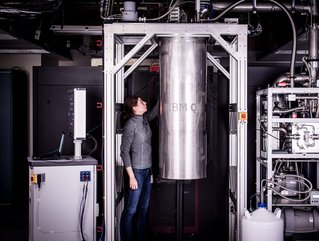IBM announces giant leap towards commercial quantum computing

IBM has announced it has built and tested its two most powerful quantum processors yet, representing a major step towards its mission to commercialise the technology.
Translating the theory of quantum computing into practical, commercially applicable reality has been a goal of researchers for decades, and IBM’s unveiling of new 16 and 17-qubit processors marks a key milestone on that journey.
Its smaller processor will be made available to researchers and programmers at no cost via the IBM Cloud platform. The larger processor will be a prototype commercial device, forming the core of the company’s first IMB Q early-access commercial systems.
The company hopes to achieve 50-qubit processing over the next few years, and in so doing open up vast computational power to science and business.
Quantum computers exploit the peculiar properties of quantum mechanics to hugely increase the amount of information a machine can handle. While conventional computers store information as bits – 1s and 0s – quantum computers use quantum bits, or qubits, which store information as 1s, 0s, or both at the same time. This, along with the other quantum phenomena of entanglement and tunnelling, enables quantum computers to manipulate colossal combinations of states at once.
Potential applications include untangling the unimaginable complexity of molecular and chemical interactions – a feat impossible even with all the world’s current computing power combined – in order to discover new materials and medicines.
It could also be turned towards business, supercharging AI capabilities or solving complex optimisation problems in logistics and supply chains, financial modelling or risk analysis.
"The significant engineering improvements announced today will allow IBM to scale future processors to include 50 or more qubits, and demonstrate computational capabilities beyond today’s classical computing systems,” said Arvind Krishna, senior vice president and director of IBM Research and Hybrid Cloud.
“These powerful upgrades to our quantum systems, delivered via the IBM Cloud, allow us to imagine new applications and new frontiers for discovery that are virtually unattainable using classical computers alone.”
VIDEO: IBM's Jerry Chow explains the potential of quantum computing






